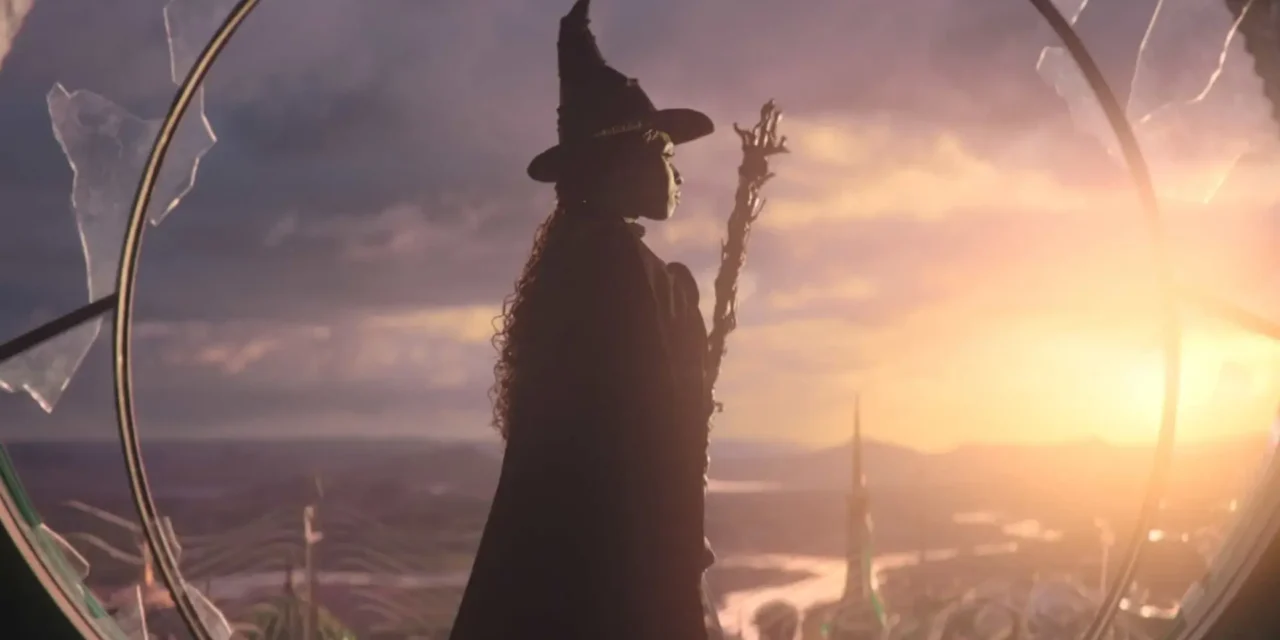What makes someone “wicked”? Is it a birthmark of our nature, or is it shaped by our experiences and choices? The movie Wicked, a reimagined look at the Wizard of Oz, flips the traditional story of good versus evil on its head. It invites us to consider the deeper struggles behind the labels we place on others—and ourselves.
Yet as engaging as this cinematic tale is, it’s hard to watch without reflecting on what the Bible has to say about the human heart. In Scripture, wickedness is not merely a label—it’s a spiritual condition we all share. As Romans 3:10 reminds us, “There is none righteous, not even one.” But that’s not the end of the story. Through Jesus Christ, we’re offered a transformation far greater than the magical promises of Oz.
In this article, we’ll explore the themes of Wicked alongside biblical truths about sin, redemption, and the ultimate journey of identity: becoming a new creation in Christ.
No One Mourns the Wicked?
In the opening moments of Wicked, the citizens of Oz gleefully celebrate the death of the “Wicked Witch of the West.” The song “No One Mourns the Wicked” sets the tone: people rejoice in the destruction of someone they believe is evil, a villain unworthy of love or redemption. But as the story unfolds, we’re forced to question whether wickedness is as simple as black and white.
The Bible, too, doesn’t shy away from addressing wickedness. However, Scripture makes one thing clear: we are all born wicked. Psalm 51:5 declares, “Surely I was sinful at birth, sinful from the time my mother conceived me.” Sin is not something external we pick up along the way; it’s a part of our nature.
Elphaba, the so-called “Wicked Witch,” is judged from birth because of her green skin—a visible marker of her difference. Similarly, the Bible tells us that our sin nature, while not always visible, is just as much a part of who we are. Isaiah 64:6 says that even our righteous deeds are like filthy rags before a holy God.
But while Oz sees Elphaba’s “wickedness” as unchangeable, the Bible offers hope: “If anyone is in Christ, he is a new creation. The old has passed away; behold, the new has come” (2 Corinthians 5:17). Unlike the Wizard’s false promises of transformation, Jesus offers real change—heart-deep, eternal, and available to all who trust in Him.
Contrast of Perspectives:
- Wicked: People are labeled as good or wicked based on outward traits and society’s judgment.
- Bible: All have sinned and fall short of God’s glory (Romans 3:23), but redemption is offered equally to all through Jesus (John 3:16).
In Wicked, Elphaba’s pain leads her to a search for acceptance and purpose, while Glinda clings to a shallow definition of “goodness.” Both characters reflect the human condition: we long to be seen, loved, and valued. Yet the Bible shows us that true acceptance doesn’t come from others or even ourselves—it comes from God through Jesus Christ.
So, what does it mean to mourn the wicked? In God’s eyes, wickedness is not the end of the story. Ezekiel 33:11 reveals His heart: “I take no pleasure in the death of the wicked, but rather that they turn from their ways and live.”
Popular, but at What Cost?
In Wicked, the theme of popularity takes center stage with Glinda’s show-stopping song “Popular.” Glinda coaches Elphaba on how to fit in, offering superficial advice to make her more likable. While Glinda’s charm and charisma win her the crowd’s approval, it becomes clear that this version of “goodness” is skin-deep, driven by vanity and the fear of rejection.
Popularity is a currency that can feel priceless in our culture. The Bible, however, warns against placing too much value on human approval. Jesus said in Matthew 6:1, “Be careful not to practice your righteousness in front of others to be seen by them. If you do, you will have no reward from your Father in heaven.” The pursuit of popularity often forces people to compromise their convictions, trading eternal truth for temporary applause.
Elphaba, by contrast, rejects the shallow pursuit of being “popular.” Her defiance earns her scorn, but it also frees her to live authentically. This choice parallels the biblical call to discipleship. Jesus didn’t promise His followers popularity or ease; instead, He warned in John 15:18-19, “If the world hates you, keep in mind that it hated me first. If you belonged to the world, it would love you as its own.”
Contrast of Perspectives:
- Wicked: Popularity is a goal, but it often leads to compromise and masks deeper insecurities.
- Bible: True goodness isn’t measured by public opinion but by obedience to God’s will, even when it means standing alone.
Elphaba’s choice to reject the crowd’s definition of goodness reminds us of the Apostle Paul’s words in Galatians 1:10: “Am I now trying to win the approval of human beings, or of God? Or am I trying to please people? If I were still trying to please people, I would not be a servant of Christ.”
Ultimately, Glinda learns that popularity is fleeting. Her initial obsession with appearances leaves her feeling hollow, while Elphaba’s willingness to be misunderstood allows her to experience a freedom Glinda can only envy.
Finding Eternal Significance
Like Glinda, we are often tempted to define ourselves by how others see us. Yet the gospel reminds us that God sees past our outward masks. In 1 Samuel 16:7, God tells Samuel, “The Lord does not look at the things people look at. People look at the outward appearance, but the Lord looks at the heart.”
The question becomes: Are we seeking popularity, or are we seeking purpose?
The Cost of Defying Gravity
One of the most iconic moments in Wicked is Elphaba’s powerful anthem, “Defying Gravity.” In this pivotal scene, Elphaba chooses to break free from societal expectations and the Wizard’s manipulative grasp. Her soaring declaration, “I’m through with playing by the rules of someone else’s game,” becomes a bold statement of self-liberation and individuality. While the song resonates deeply with audiences, its deeper implications reveal both an inspiring and cautionary tale.
Elphaba’s defiance represents a longing for freedom that we all share—a desire to rise above injustice and oppression. Yet, as Christians, we are reminded that freedom must be rooted in truth. Galatians 5:13 tells us, “You, my brothers and sisters, were called to be free. But do not use your freedom to indulge the flesh; rather, serve one another humbly in love.” Elphaba’s journey toward liberation mirrors humanity’s own struggle to balance freedom and responsibility.
Rebellion vs. Righteousness
In her attempt to rise above, Elphaba rejects the Wizard’s authority entirely. This rebellion feels righteous in the moment, as the Wizard represents deception and corruption. But in the absence of a clear moral compass, Elphaba’s defiance edges toward self-reliance and isolation.
The Bible provides a stark contrast to this approach. While Jesus also defied oppressive authorities, He did so in submission to God’s will, not as an act of self-assertion. Philippians 2:8 tells us, “And being found in appearance as a man, He humbled Himself by becoming obedient to death—even death on a cross!” Jesus’s defiance was not about self-exaltation but about fulfilling God’s plan of redemption.
Elphaba’s declaration of independence can be empowering, but it also reminds us of the danger of rejecting all authority, including God’s. Proverbs 14:12 warns, “There is a way that appears to be right, but in the end it leads to death.” True freedom is found not in defying all rules, but in surrendering to the One who gives life and purpose.
The Biblical Call to Soar
While Wicked celebrates Elphaba’s act of defiance, the gospel invites us to “defy gravity” in a different way. Hebrews 12:1-2 calls believers to “throw off everything that hinders and the sin that so easily entangles. And let us run with perseverance the race marked out for us, fixing our eyes on Jesus, the pioneer and perfecter of faith.”
In this context, “defying gravity” means rejecting sin and the weight of worldly expectations, not rebelling against God. Jesus’s invitation in Matthew 11:28-30—to exchange our burdens for His yoke—reminds us that true freedom comes not from self-reliance but from resting in His grace.
A Higher Purpose
Elphaba’s soaring anthem encourages us to dream big and challenge corruption, but her journey also reveals the limits of human striving. Only in Christ can we find the power to rise above not just societal injustice, but the sin that separates us from God. Isaiah 40:31 declares, “But those who hope in the Lord will renew their strength. They will soar on wings like eagles; they will run and not grow weary, they will walk and not be faint.”
Reflections for the Heart
The next time you feel the urge to “defy gravity,” ask yourself: Am I breaking free from sin and worldly expectations to pursue Christ, or am I relying on my own strength to rebel against God’s design? True freedom, after all, isn’t about escaping authority—it’s about finding your identity and purpose in the One who holds all authority.
Defying Expectations: A Wicked Redemption
Wicked invites us to see the world differently—to question the labels society places on people and to embrace the complexities of identity and acceptance. Yet, as powerful as its story is, it stops short of offering the ultimate answer to our struggles with rejection, sin, and the search for purpose.
The Bible takes us further. It doesn’t just acknowledge the reality of wickedness in the world—it shows us the way out. Romans 3:23-24 proclaims, “For all have sinned and fall short of the glory of God, and all are justified freely by His grace through the redemption that came by Christ Jesus.” While Wicked explores Elphaba’s journey to rise above condemnation, the gospel offers something greater: freedom from condemnation altogether (Romans 8:1).
Elphaba may have defied expectations, but Jesus Christ overturned them completely. He took on the label of “sinner” in our place, bore the punishment for our wickedness, and exchanged it for His righteousness (2 Corinthians 5:21). His life, death, and resurrection offer us the ultimate redemption story—not just of one misunderstood person but of the entire world.
The Call to Reflect His Grace
What does this mean for us? It’s a call to look beyond the surface, both in ourselves and in others. Where the world sees “wicked,” God sees a person He loves, someone He longs to redeem. Through Christ, we are called to see others as He sees them: with grace, mercy, and hope.
Ephesians 4:32 instructs us, “Be kind and compassionate to one another, forgiving each other, just as in Christ God forgave you.” Like Elphaba and Glinda, we may not always understand one another. But in God’s kingdom, even the most broken relationships can become vessels of His grace.
The Final Question
As we reflect on Wicked, its themes of identity and redemption point us to a greater truth: that we are not defined by our failures or the labels the world gives us. In Christ, we are new creations, fully accepted and unconditionally loved.
So, ask yourself: Are you living in the light of God’s grace? Have you allowed His redemption to define your story, transforming what was once “wicked” into something beautiful? And are you sharing that hope with others, showing them the love of a Savior who changes us not just “for good,” but forever?











Recent Comments